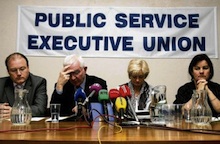
The Garda police in the 26 Counties are to hold an illegal ballot to join state-wide strike actions following the collapse in pay talks between the Dublin government and Ireland’s main public sector trade unions.
The government has said it will go ahead with a plan for 1.3 billion Euro worth of cuts to the public sector pay bill. After strong criticism of a plan for cuts to take the form of additional unpaid leave for all civil servants, since abandoned by the Taoiseach Brian Cowen, it remains unclear how the pay cuts will be implemented.
Rank and file Gardai police are to be balloted on taking industrial action despite such a ballot or any withdrawal of labour by a Garda member being a criminal offence punishable by up to five years imprisonment.
The move by the Garda Representative Association (GRA) represents a major escalation between public sector workers and the hugely unpopular coalition government over cutbacks and threatened pay reductions.
GRA general secretary PJ Stone said his association had decided to hold the unprecedented ballot because his members now felt “valueless and worthless”.
He denied he was “putting it up to” the coalition government. “We’re not putting it up to anybody. But we are being upfront in our actions.”
Under the Garda Siochana Act 2005, following the unofficial ‘Blue Flu’ walk-out, it is a criminal offence for a member of the force to withdraw their labour or to induce anybody to withdraw their labour.
On conviction the offence carries a penalty of up to five years in jail and/or a fine of up to 50,000 Euro.
The 26 County state is facing into a period of major industrial action as details of the government’s planned cuts continued to emerge in the media.
Public sector unions warned of a long and sustained campaign of strikes after talks with the government collapsed last week.
Union leaders met in Dublin today to devise a strategy if the government proceeds with planned public sector pay cuts in Wednesday’s Budget. Unions say the action will be different in character and substance to previous one-day stoppages.
IMPACT General Secretary Peter McLoone admits widespread and severe disruption to public services may be in store.
“What we have to do is prepare for a campaign that is going to be long and sustained, and that has to be different,” Mr McLoone said.
“We’re not setting out to inflict suffering on the public, but we are recognising that if there is disruption to services, that is something that the Government has to take responsibility for.”
In its briefings, government officials attempted to soften the blow by indicating that the pay cuts would be proportionately larger for those on higher incomes. it is being reported that the average cuts in public sector pay will be between 5 and 6 per cent, while those on higher salaries of 100,000 Euro or more can expect cuts of more than 7 per cent.
Those earning over a half a million Euro a year, mainly radio and television broadcasters, will suffer the greatest loss in income, of up to ten per cent, while those on the lowest salaries will have cuts below the average, at three or four per cent.
In the continuing fall-out from the collapse of the pay talks, secretary general of the Irish Congress of Trade Unions David Begg yesterday again defended the controversial unpaid leave proposal would he said have resulted in almost a billion Euro in pay reductions. Mr Begg said ‘social partnership’, under which public policy was for decades negotiated between the major trade unions and government officials, was now at an end.
The split came despite a peripheral agreement being reached on a draft health reform plan in the prolonged negotiations, which collapsed on Friday.
“When the Taoiseach spoke on the steps of Government Buildings at four o’clock on Friday [to announce that there was no deal on pay cuts] he didn’t just cut the ground from under these negotiations, he also drove down the model of social partnership that we’ve had for 22 years,” he said.
In an unprecedented budget speech on Wednesday, Finance Minister Brian Lenihan is to outline fur billion Euro in cuts and is expected to announce reductions of 4 per cent in social welfare payments, and cuts of between 9 and 10 per cent in child benefit.
Cuts in social welfare will be applied across the board with the exception of pensions. In addition, any person under 23 who does not participate in a training course will see their unemployment benefit cut by 20 per cent.
There is also a plan to end rent supplement payments and force recipients to move into disused and abandoned housing developments currently being purchased by the state through its NAMA ‘bad bank’.
Minister for Foreign Affairs Micheal Martin said that the budget would be tough, but would “generate confidence that Ireland has the capacity to deal with the severe problems facing us”.
![[Irish Republican News]](https://republican-news.org/graphics/title_gifs/rn.gif)
![[Irish Republican News]](https://republican-news.org/graphics/title_gifs/harp.gif)

